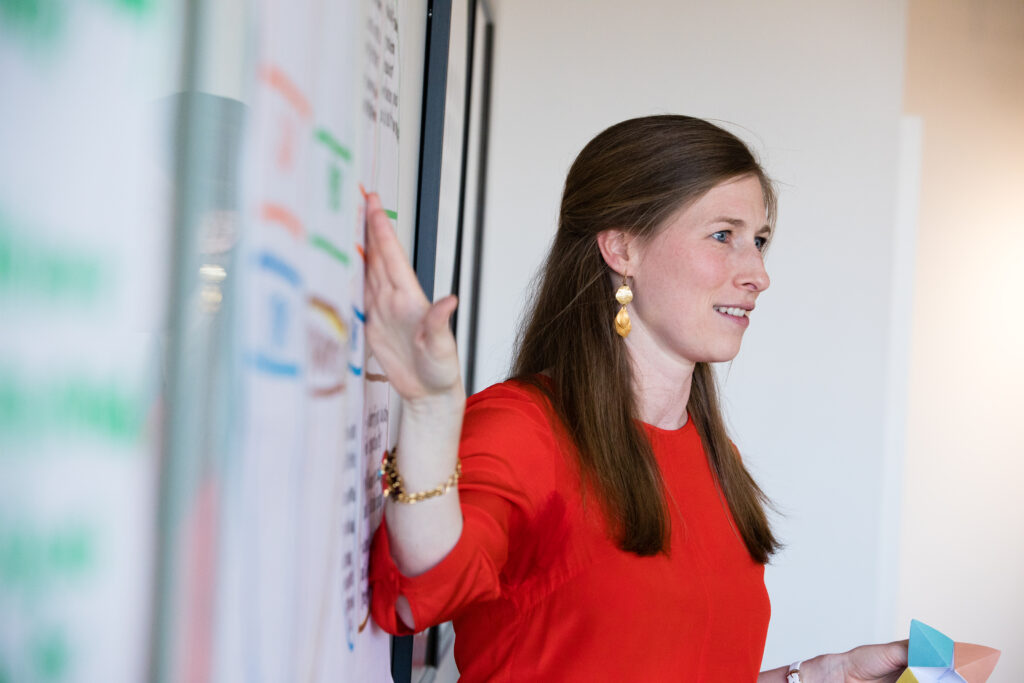How we’ve worked on Aligning Values at ProInspire
By Kristen Lucas
As Chief Operating Officer at ProInspire, my role is to shape our policies and processes to help us deeply live our organizational values. It’s the difference between our core values being posted on social media and being actually realized in all that we do. While this work has fueled me for many years, as a working parent in the time of COVID, I’ve felt the impact of it in new ways. And, as a white woman working towards racial equity, conversations with colleagues in 2020 helped me realize how this work is essential to building an anti-racist organization.
Because we’re all swimming in the water of racism, white dominant culture is the default. Even with strong diversity statements and missions for social good, organizations often still perpetuate the very same systems they’re trying to disrupt. It is so easy to fall back on habits and let characteristics like urgency, perfectionism, binary thinking, and quantity over quality be the assumed “best practices” or markers of success. Staff members do things the way they’ve always done them or how they think they have to do them—especially in operations, human resources, and finance—because “it’s just the way it is.”
So, at Proinspire, we’re trying to do things differently. We’ve recognized that everything within our organization has a racial equity impact. We’re committed to disrupting white dominant culture by building a workplace that honors the humanity of our team members. And, we’re building the accountability to that commitment into our policies.
In our Self to Systems Leadership model, we call this organizational commitment “aligning values.” At its core is the belief that the way an organization operates—from its culture to the internal policies and procedures—needs to match its stated racial equity beliefs and values. In other words, we need to have congruence between what we say, what we do, and how we do it. Aligning values also includes changing ways of working so that leaders at all levels, and in particular Black, Indigenous, and other People of Color (BIPOC) staff, are co-creating culture, sharing responsibility, and supporting strategic direction.
Admittedly, aligning values is not simple or linear. It takes a great deal of time, trust, and transparency. And, the truth is that it’s never really done. You can’t make a list and check it off because we are constantly deepening this alignment as we respond to new challenges, new ways of thinking, and new emerging needs. Frankly, sometimes, you might get it wrong and need to recalibrate. That’s part of it!
So, while I can’t offer you the one way for aligning values, I can share some of the journey we’ve been on at ProInspire and the possibilities we continue to explore.
Getting Started with Aligning Values

In 2017-2018, we defined organizational core values for our new website. But even after committee work and many team meetings, we struggled with how aspirational they felt. We were still growing into them in early 2020 when the pandemic began and it became obvious that there was a lack of alignment that was causing harm.
We didn’t have dedicated time to learning and teamwork. The urgency of our racial equity work was creating additional emotional labor, especially for my BIPOC colleagues. And we felt over-worked and under-supported as we pivoted to working from home. Clearly, something needed to change.
We knew we needed more capacity, so we started planning to expand the team (spoiler alert: we grew from a team of 5 to 11 by the end of 2021!). Meanwhile, we updated our policies and processes so that our current team (and new team) could find better balance. To do this, we went back to describe how our values would drive this process:
- Equity: We prioritize approaches that serve all of us and promote our collective impact and wellbeing, first meeting the needs of staff who experience marginalization or oppression because of their identities and those who have the least access to decision-making power.
- Collaboration: We identify both individual and collective solutions, recognizing that we have different needs and providing flexibility and support for each other.
- Authenticity: We share transparently about the opportunities and limitations we face, engaging each other in the process to shape our approach and priorities.
- Courage: We think creatively and with an abundance mindset about how our policies can help us meet our goals, identifying how various solutions can strengthen our culture.
With these values-in-action as our north star, we began a process of revisiting our old ways of being and doing, trying out alternatives, and documenting what worked.
Active (Un)Learning, Intentional Action, and Accountability
Here are a few examples of the practices we’ve explored to find greater alignment with our values and some of the policies or processes that have codified them.
- Interrogating white dominant culture and revisiting ways of working.
ProInspire has always honored a “flexible work” culture. But, in practice, the lack of structure and our pace of work made team members feel like they always had to be “on” and yet they couldn’t meaningfully engage with each other. So, we defined new work boundaries with an average weekly capacity of 35-hours, held core working hours from 10am to 4pm, and started “Internal Mondays” for our team conversations. With these boundaries, we can still trust each other to do our work in the way that’s best for each of us. And, by naming when we expect people to be available, we can define manageable workloads and create structure around the work day, allowing for more freedom, equity, and safety. This clarity has supported team members to put in effort where it’s most needed, and created ease when they turn off their computers at the end of the day.
- Intentionally adapting work and supporting employee well-being.
When we pivoted to virtual, we felt disconnected from each other and missed the little things like brainstorming with post-its or having impromptu lunch together. We also realized that working from home created blurred lines between life and work, and for some folks, there was an increase in personal expenses. So, we tried some new approaches to our work with tech tools like Jamboard and Slack and held optional “team-care time” to connect personally. We started a fund to help team members set up home offices, reduce the impact of telework costs, and have access to coworking spaces, as we each need. And, we piloted a broadly-defined wellness benefit for each team member to prioritize time for wellbeing and offset the cost of things that bring balance, joy, and rest. From ergonomic chairs and extended monitors, to Peloton subscriptions and acupuncture appointments, our team feels much more supported at work and at home. And, as we’ve become an official remote organization, we’ve turned these short-term solutions into core practices and policies.
- Changing performance and promotion processes and addressing pay equity gaps.
While growing quickly was part of the solution for our capacity challenges, it also quickly tested our organizational structure. We learned the need for a just right pace for onboarding and recognized the time it really takes to build relationships virtually. We launched a new performance management framework and platform with a restructured annual review process to include more perspectives. After engaging a consultant partner on a pay equity audit, we recalibrated our compensation and benchmarking to the market, considering how we can account for systemic inequities in our field. In that process, we also consolidated the number of roles and titles to be more supportive for the size of our team. Finally, we re-set expectations for each role to be more clear and show the pathway within the organization, and now we are going back to the performance framework and the pay structure to ensure they are consistent. Our team has felt cared for and supported by these efforts, and also shared constructive feedback that will help us shape the work moving forward.
What’s next?
Whew! Just writing this blog post has helped me realize how much we’ve accomplished. And, each of these examples included missteps and resets. We’ve recognized that while things sound good in policy, they don’t always lead to the change we want to see. We’ve missed opportunities and created confusion in the overlap of systems that should have been connected, but weren’t yet speaking to each other. And, we’ve realized that we were simply trying to do too much and not giving each process the spaciousness that it deserves.
My advice to you: There will always be more you can do to deepen your values alignment, but you have to start somewhere. It will likely feel small and insufficient at first. Expect that there will be unexpected needs and ripple effects that will naturally take shape. You will need time to really understand the impact of each change on your team so you can align to your intentions.
Similarly for ProInspire, the work continues! We’re still exploring how to make our structures more clear. In our weekly full-team Monday meetings, we’re discussing how we staff our projects with more explicit roles and expectations and whether we need to adjust our ways of working further. We will be identifying promotion criteria, clarifying our capacity, and fine-tuning or expanding some of our benefits. As we look ahead to 2023, our team will be building a culture of deeper collaboration, which will require more consistent and multi-directional feedback cycles and build in restorative practices with a Self-to-System approach.
When the work inevitably gets messy—and I know it will—I reground in the knowledge that disrupting and exploring new ways of being is an embodiment of our values in and of itself. While I don’t know where this journey will take ProInspire, I do know that we will need equity, collaboration, authenticity, and courage to get there.

Kristen Lucas
Chief Operating Officer
In the spirit of celebrating one of ProInspire’s core values—collaboration—I’d like to thank my colleagues Rosie Aquila and Chiavone Mobley for their time, support, and contributions to this blog.
